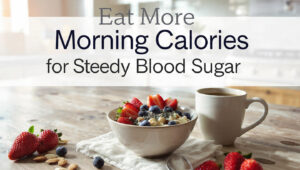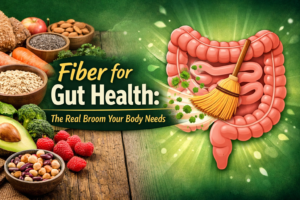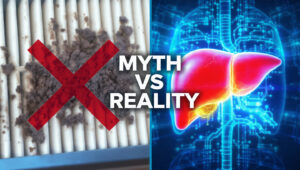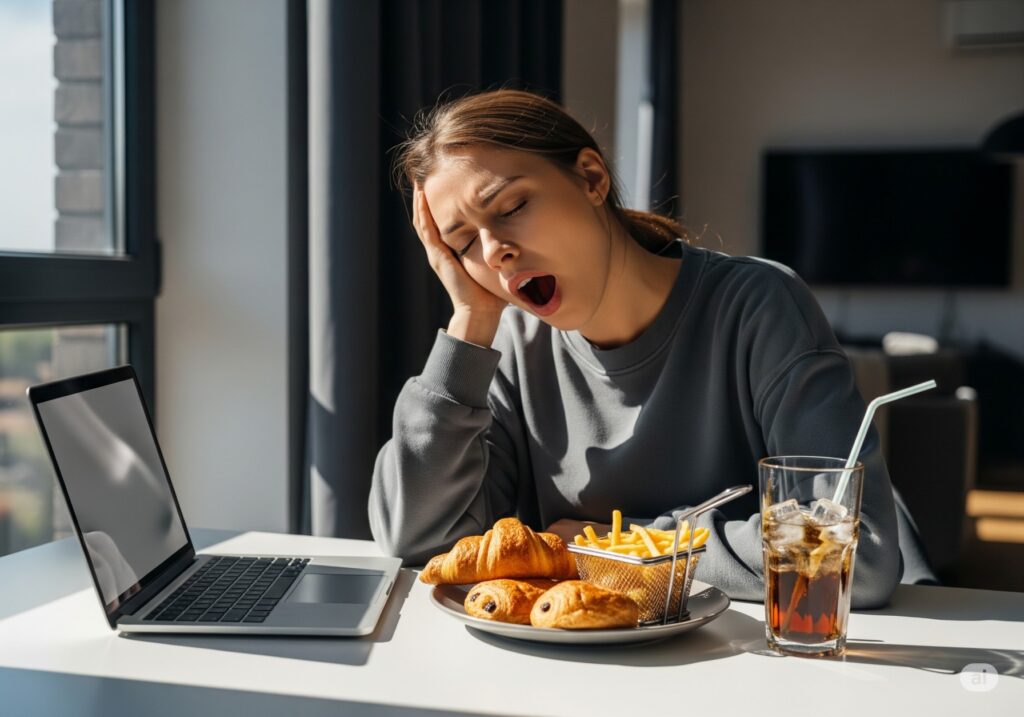
Tired woman at desk with unhealthy foods that cause daytime sleepiness
Keep nodding off? Learn five common foods and drinks that trigger daytime sleepiness and how to swap them for energy-friendly choices.
Feeling sleepy? 5 foods that cause daytime sleepiness
We all hit a slump now and then. But if you feel drowsy most afternoons, your plate might be part of the story. Diet affects alertness through blood sugar swings, hormones, and sleep quality. Therefore, choosing what and when you eat matters. Below, experts reveal five foods that cause daytime sleepiness, why they do it, and simple fixes.
Quick note: If excessive sleepiness is new, severe, or paired with snoring, breathing pauses, or mood changes, please speak with a clinician. Food helps, but medical issues can hide underneath.
1) Refined carbs and sugary treats are foods that cause daytime sleepiness
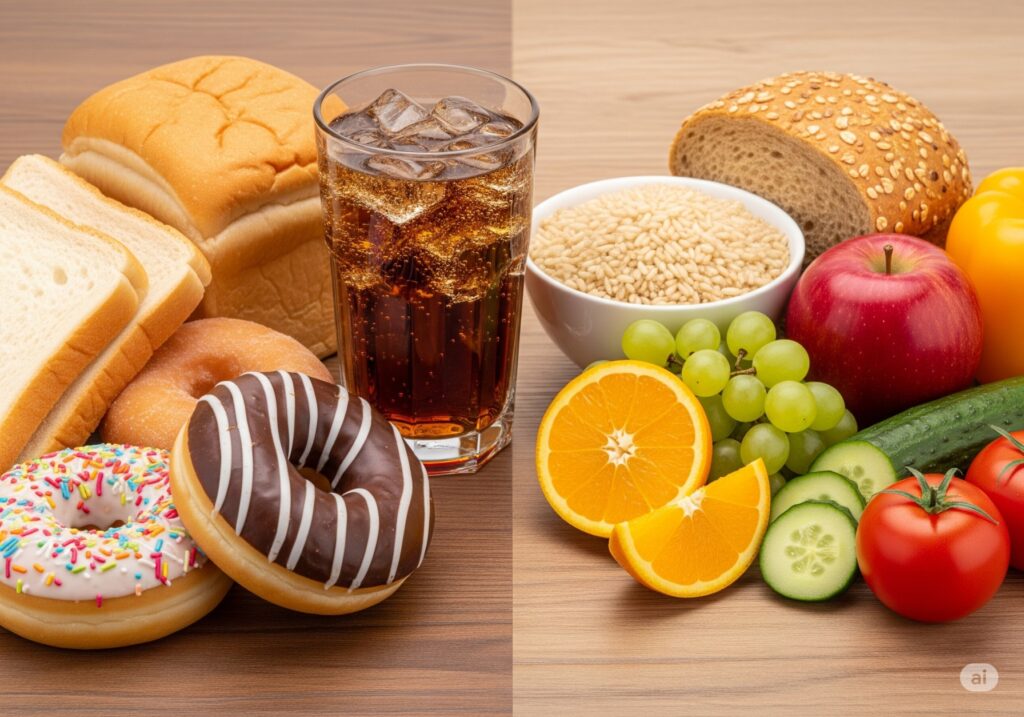
White bread, sugary cereals, pastries, and sweet beverages digest fast. As a result, blood sugar rises quickly, then drops. That swing can leave you lethargic and foggy. Research links higher glycemic load to sleep problems and daytime tiredness. In fact, studies suggest high-GI meals can shorten time to fall asleep but may worsen overall sleep quality and next-day alertness. PMC+1, The Journal of Nutrition
Try this instead: Choose fiber-rich carbs. Go for oats, brown rice, whole-grain rotis, beans, fruits, and vegetables. Moreover, pair carbs with protein and healthy fat to steady energy.
Smart swap: Trade a sweet soda for sparkling water with lemon. Or, swap a white-flour bun for a whole-grain roll with hummus.
2) Heavy, high-fat fried foods are foods that cause daytime sleepiness
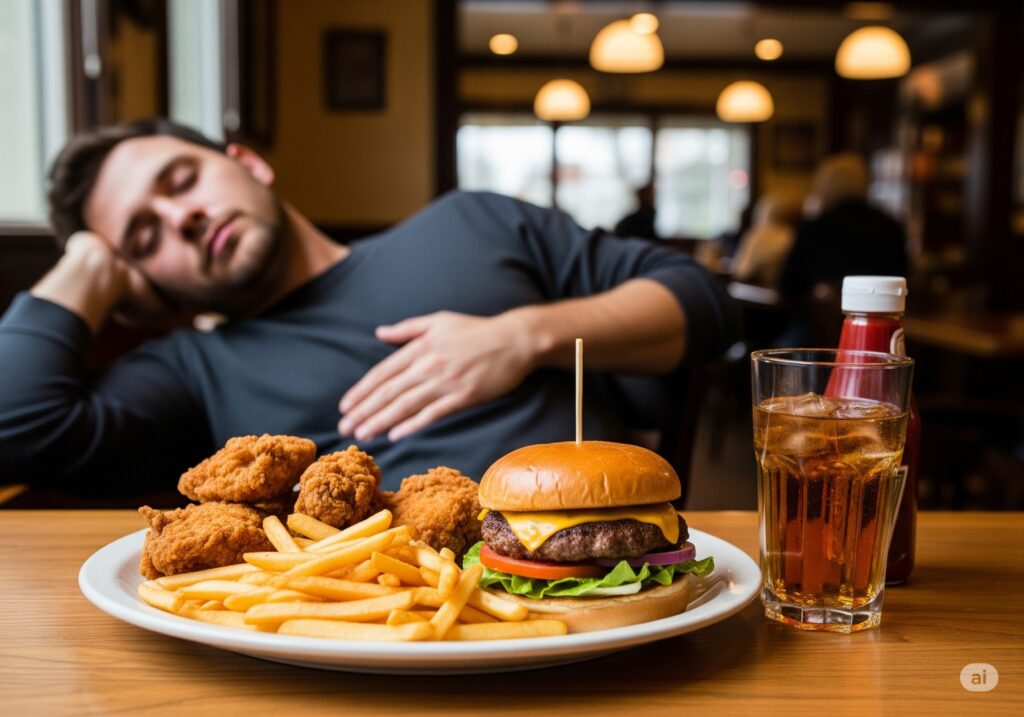
Burgers, fries, creamy gravies, and deep-fried snacks can intensify the “food coma.” Controlled studies show that higher-fat meals increase post-meal sleepiness 2–3 hours after eating. Additionally, newer evidence suggests that even a single high-saturated-fat meal can impair focus and cerebral blood flow. That can translate to sluggish thinking. PubMed+1, OSU News, ScienceAlert
Try this instead: Choose baked, grilled, or air-fried options. Include nuts, seeds, olive oil, or avocado in small amounts. Likewise, keep portions moderate at lunch if you need a sharp afternoon.
Smart swap: Replace a creamy, fried thali side with dal + sabzi and a salad. You will feel lighter yet satisfied.
3) Alcohol (beer, wine, cocktails) is functionally among foods that cause daytime sleepiness
Alcohol feels sedating at first. However, it fragments sleep later in the night and reduces REM sleep. That leaves you groggy the next day—even after “sleeping.” Meta-analyses and sleep-lab data confirm these disruptions, especially when drinking close to bedtime. Sleep Foundation, ScienceDirect, PMC
Try this instead: If you drink, do so earlier with food. But avoid alcohol within 3–4 hours of bedtime. Additionally, plan alcohol-free nights on workdays.
Smart swap: Try a lime soda with mint, unsweetened iced tea, or a zero-proof cocktail at dinner.
4) Caffeine late in the day can become foods that cause daytime sleepiness tomorrow
Coffee and energy drinks boost alertness now. Yet caffeine taken too late reduces total sleep time, deep sleep, and sleep efficiency. Therefore, you feel sleepy the next day and crave more caffeine—a loop. Systematic reviews show consistent sleep disruption when caffeine is consumed within roughly three hours of bedtime. PubMed, ScienceDirect, Oxford Academic
Try this instead: Set a “caffeine curfew.” For many people, that’s 2–3 p.m. Consider half-caf, smaller cups, or switching to herbal tea later in the day.
Smart swap: Need a lift at 4 p.m.? Take a brisk 10-minute walk and sip water. Light plus movement often beats another espresso.
5) Large mixed meals (especially rich in protein + carbs) are stealth foods that cause daytime sleepiness
Portion size matters. Big lunches can strain digestion, potentially heightening post-meal drowsiness. The classic “post-lunch dip” is a normal circadian lull, but large, heavy meals can worsen it. Additionally, protein- and carbohydrate-heavy feasts (think turkey, potatoes, and dessert) are often blamed on tryptophan. However, the “turkey makes you sleepy” idea is mostly a myth; size and mix of the meal are bigger culprits. PubMed, Sleep Foundation, Inside UNC Charlotte
Try this instead: Eat smaller, balanced plates more often. Include veggies for volume and fiber. Meanwhile, keep desserts modest at midday.
Smart swap: Split your big lunch into two mini-meals two hours apart. You’ll likely feel steadier.
How to outsmart foods that cause daytime sleepiness (quick checklist)
- Build meals around fiber: vegetables, legumes, whole grains. This steadies blood sugar. PMC
- Add lean proteins (dal, beans, tofu, fish, eggs) and healthy fats in small amounts.
- Hydrate. Even mild dehydration can feel like fatigue.
- Get light and move. A short outdoor walk after eating reduces the slump. Medical News Today
- Sleep on a schedule. Because poor sleep magnifies the afternoon dip. PubMed
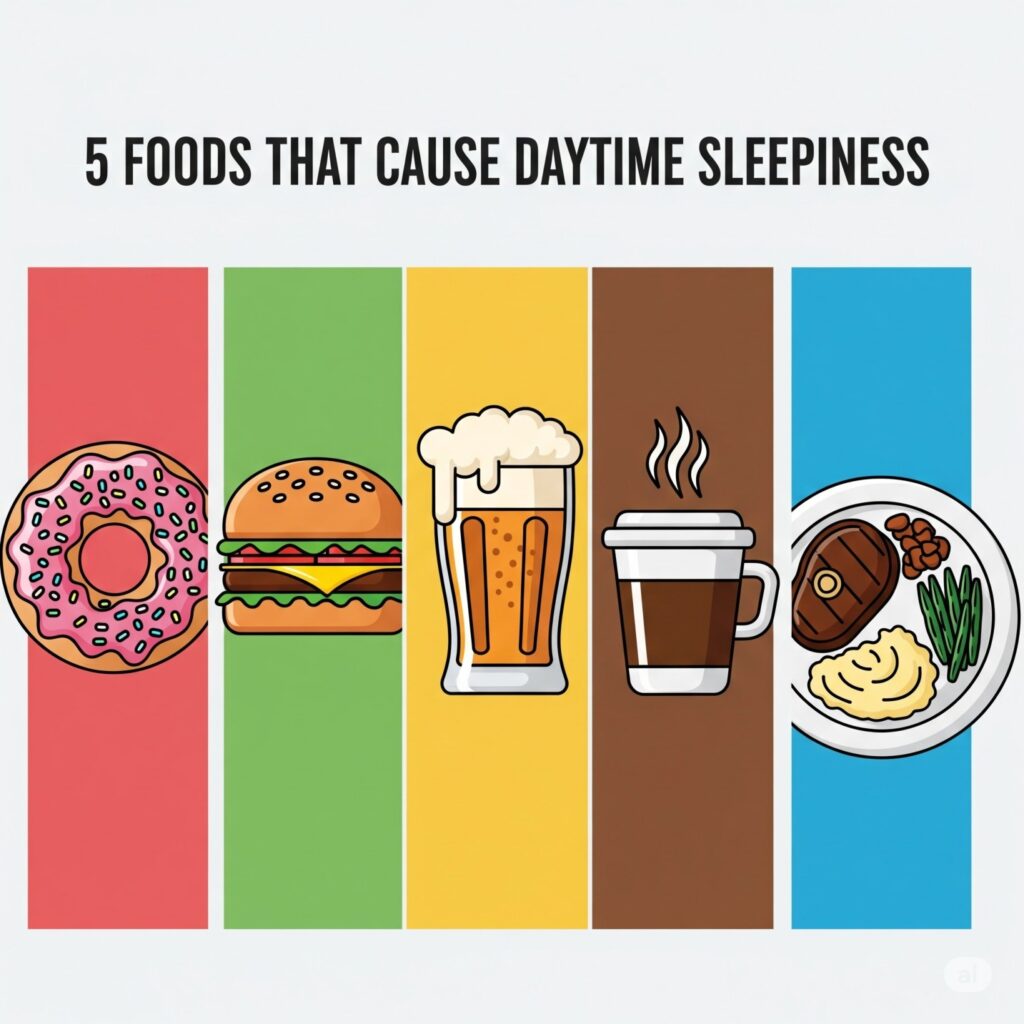
FAQs on foods that cause daytime sleepiness
Do certain foods always make everyone sleepy?
Not always. Biology, sleep debt, and timing matter. Nevertheless, refined carbs, heavy fats, alcohol, late caffeine, and oversized meals are common triggers. Sleep Foundation
Is tryptophan the real reason I’m sleepy after a big meal?
Not mainly. Turkey isn’t unique in tryptophan. The overall meal size and composition play larger roles. Inside UNC Charlotte
What if I still feel drowsy after changing my diet?
Consider stress, screens before bed, sleep disorders, medications, anemia, or thyroid issues. Then, check with a healthcare professional. The Times of India, Verywell Health
Helpful links
- Why do you get sleepy after eating (Sleep Foundation)? Sleep Foundation
- Alcohol and sleep (Sleep Foundation). Sleep Foundation
- Caffeine’s impact on sleep: systematic review and update. PubMed, Oxford Academic
- Read next: 5-minute breathing habit for a stronger heart and brain — a quick routine that pairs well with alertness goals.
Source links (studies and expert summaries)
- High-fat meals increase post-meal sleepiness. PubMed+1
- High-GI patterns and sleep problems. PMC
- Night-shift alertness: low-GI vs high-GI meals. The Journal of Nutrition
- Single high-fat meal and focus/blood flow. OSU News, ScienceAlert
- Alcohol fragments sleep and reduces REM. Sleep Foundation, ScienceDirect
- The “post-lunch dip” circadian effect. PubMed
- Tryptophan/turkey myth context. Inside UNC Charlotte
Final tip
Tweak one lever at a time. For example, swap the refined carb at lunch, then bring your caffeine curfew earlier. Track how you feel for a week. Because small, steady changes add up.
Medical Disclaimer: This article is for educational purposes only and is not a substitute for professional medical advice, diagnosis, or treatment. Always consult a qualified healthcare provider with any questions you may have about your health or before making changes to your diet or lifestyle.
Call to Action: If you found these tips helpful, share this article with friends and family. For more science-backed health insights, explore our latest blogs on Nowspress.

